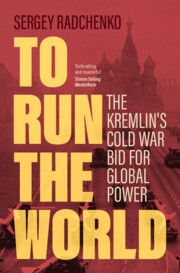Book contents
- To Run the World
- Reviews
- TO Run the World
- Copyright page
- Dedication
- Contents
- Introduction
- Part I Ambition
- Part II Hubris
- 5 Love Us as We Are
- 6 The Golden Hoop
- 7 Twin Crises
- 8 Killing Flies
- 9 The Spirit of Camp David
- 10 Berlin
- 11 Cuba
- Part III Decline
- Part IV Collapse
- Acknowledgments
- Figures
- Notes
- Bibliographical Essay
- Index
8 - Killing Flies
from Part II - Hubris
Published online by Cambridge University Press: 30 May 2024
- To Run the World
- Reviews
- TO Run the World
- Copyright page
- Dedication
- Contents
- Introduction
- Part I Ambition
- Part II Hubris
- 5 Love Us as We Are
- 6 The Golden Hoop
- 7 Twin Crises
- 8 Killing Flies
- 9 The Spirit of Camp David
- 10 Berlin
- 11 Cuba
- Part III Decline
- Part IV Collapse
- Acknowledgments
- Figures
- Notes
- Bibliographical Essay
- Index
Summary
In 1958–59, Khrushchev acted aggressively, most notably with his ill-conceived attempt to force the Allies out of Berlin. This move was partly a response to Mao's actions in the Taiwan Strait and a similar calculation of war risks. Both leaders believed their gambles would not trigger a military response from the United States, but Khrushchev soon realized he had miscalculated. Instead of adhering to his deadline, Khrushchev engaged the West in a dialogue. In September 1959, he visited the United States, gaining the recognition he so desired. Meanwhile, the Great Leap Forward, which Mao launched to prove that China was better than the USSR at building socialism, resulted in a massive famine in China. The failure of the Great Leap boosted Khrushchev's confidence, but Sino-Soviet relations continued to worsen.
Keywords
- Type
- Chapter
- Information
- To Run the WorldThe Kremlin's Cold War Bid for Global Power, pp. 230 - 250Publisher: Cambridge University PressPrint publication year: 2024

